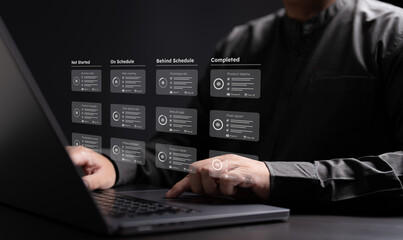Effective workflow management is a cornerstone of successful project management. In TaskTrain, workflows are designed to enhance project management by streamlining processes, improving efficiency, ensuring consistent outcomes, and facilitating better communication and collaboration. This comprehensive guide explores the multifaceted impact of workflows on project management within TaskTrain.
Streamlined Processes
Workflows in TaskTrain streamline project processes by providing a structured approach to task management. Each step of a project is clearly defined, with specific roles and responsibilities assigned to team members. This structure ensures that tasks are completed in the correct sequence, reducing the risk of errors and omissions. Streamlining processes eliminates redundancies and prevents bottlenecks, allowing projects to progress smoothly from initiation to completion.
Improved Efficiency
TaskTrain's workflows significantly enhance efficiency by automating routine tasks and standardizing procedures. Automation reduces the time and effort required to manage projects, enabling team members to focus on high-value activities rather than mundane, repetitive tasks. For example, automated notifications can remind team members of upcoming deadlines, while pre-defined templates can simplify the creation of project documents. This increased efficiency not only speeds up project completion but also ensures optimal utilization of resources.
Enhanced Communication and Collaboration
Effective communication and collaboration are crucial for the success of any project. TaskTrain's workflows facilitate these by providing a transparent framework where everyone understands their roles and responsibilities. With clear workflows, all team members know what needs to be done, by whom, and by when. This clarity helps prevent misunderstandings and fosters a collaborative environment. Team members can easily track progress, share updates, and address issues in real time, ensuring that the project stays on track.
Consistent Quality and Compliance
Standardized workflows in TaskTrain ensure that all team members follow the same procedures, leading to consistent quality in project deliverables. This consistency is particularly important for maintaining compliance with industry standards and regulations. For instance, in industries such as healthcare or finance, adhering to regulatory requirements is critical. TaskTrain’s workflows help ensure that all necessary steps are followed and documented, reducing the risk of non-compliance and ensuring high-quality outputs.
Effective Resource Management
TaskTrain provides project managers with a comprehensive view of all tasks and their status, enabling effective resource management. With a clear overview of project activities, managers can allocate resources more efficiently, ensuring that team members and tools are deployed where they are most needed. Proper resource management helps prevent overallocation or underutilization of resources, ensuring that projects are completed on time and within budget. Additionally, TaskTrain's resource management features allow for the tracking of resource availability, skillsets, and workloads, enabling better planning and execution.
Risk Mitigation
Risk management is an integral part of project management. TaskTrain's workflows include built-in checks and balances to identify and mitigate risks early in the project lifecycle. By systematically addressing potential issues through predefined steps, workflows help prevent small problems from escalating into major setbacks. For example, regular risk assessments and contingency planning can be incorporated into the workflow, ensuring that risks are identified, assessed, and managed proactively. This proactive approach to risk management enhances project stability and success rates.
Performance Monitoring and Reporting
TaskTrain’s workflows come with robust tracking and reporting features that provide real-time insights into project performance. Managers can monitor progress, identify deviations from the plan, and make informed decisions to keep the project on track. Regular performance monitoring allows for the timely identification of issues, enabling prompt corrective actions. Additionally, reporting features in TaskTrain help evaluate team performance, identify areas for improvement, and ensure accountability. These insights are invaluable for optimizing workflows and achieving project goals.
Scalability
One of the key advantages of TaskTrain's workflows is their scalability. Whether managing a small project or a large, complex one, TaskTrain’s workflows can be easily adjusted to accommodate additional tasks, team members, or new processes. This scalability ensures that the workflow remains efficient and effective, regardless of project size or scope. As projects grow, workflows can be refined and expanded to meet evolving needs, ensuring continuous improvement and adaptability.
Customization and Flexibility
TaskTrain offers customization options that allow project managers to tailor workflows to the specific needs of their projects. Customizable workflows enable managers to define unique steps, assign roles, and set priorities that align with project objectives. This flexibility ensures that workflows are not one-size-fits-all but are instead tailored to the unique requirements of each project. Customization also allows for the incorporation of best practices and lessons learned from previous projects, enhancing the effectiveness of workflows.
Integration with Other Tools
TaskTrain integrates seamlessly with other project management tools and software, enhancing its functionality and ease of use. Integration with tools such as communication platforms, document management systems, and financial software allows for a cohesive project management experience. For example, integrating TaskTrain with a communication tool like Slack can streamline team collaboration, while integration with a financial tool can provide real-time budget tracking. These integrations ensure that all aspects of project management are connected, reducing the need for manual data entry and enhancing overall efficiency.
Continuous Improvement
TaskTrain's workflows support continuous improvement by providing a framework for regular review and optimization. Project managers can analyze workflow performance, identify areas for improvement, and implement changes to enhance efficiency and effectiveness. Continuous improvement ensures that workflows evolve with the changing needs of the project and the organization, leading to better outcomes over time. Regularly reviewing and refining workflows helps maintain high standards of performance and adaptability in a dynamic project management environment.
Conclusion
Workflows in TaskTrain have a profound impact on project management by streamlining processes, improving efficiency, enhancing communication and collaboration, ensuring consistent quality and compliance, managing resources effectively, mitigating risks, providing performance insights, offering scalability, and supporting continuous improvement. By leveraging these benefits, TaskTrain enables project managers to deliver successful outcomes consistently. Effective workflow management is essential for navigating the complexities of modern project management and achieving project goals efficiently and effectively.
Visit: https://www.tasktrain.app/
Source: https://diigo.com/0wcz5i





Comments